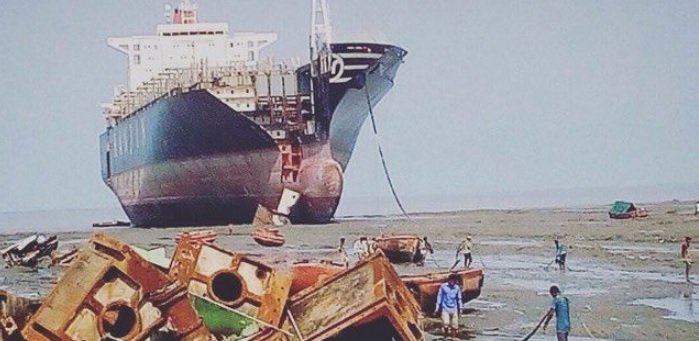BIMCO has drafted a paper to submit to the Conference of the Parties to the Basel Convention (BC COP-17), asking for more clarity and for obstacles to be removed as the Hong Kong Convention enters into force in two months.
The paper has been prepared by BIMCO’s recently established Ship Recycling Alliance, which represents both the global shipping as well as the main ship recycling industries located in Bangladesh, India, Pakistan and Türkiye.
With the document, the Alliance aims to present a full overview and increase the understanding of the process up until today. It warns that current inconsistencies between the two conventions affecting ship recycling will slow down progress.
On 26 June 2025, the Hong Kong International Convention for the Safe and Environmentally Sound Recycling of Ships (the Hong Kong Convention) will enter into force alongside the Basel Convention on the Control of Transboundary Movements of Hazardous Wastes and their Disposal (the Basel Convention).
The Hong Kong Convention offers significant advancement in harmonising global standards of the ship recycling industry. This includes an improved reporting system for ships destined for dismantling and an approach to address the ships’ entire lifespan as opposed to only addressing end-of-life ships via the BC’s Prior Informed Consent (PIC) Procedure.
The Hong Kong Convention is only two months from entering into force. While it is crucial for the future of safe and sound ship recycling, for people and the environment, inconsistencies and contradictions between the conventions still exist. If these obstacles are not removed, we fear it will slow down the progress of improving the global ship recycling industry.
…said David Loosley, Secretary General & CEO, BIMCO.
Currently, there are several overlaps and conflicts with the provisions of the Basel Convention (BC). One important example is that the Hong Kong Convention (HKC) relies on the concept of the flag State and the recycling State. This contradicts the Basel Convention’s procedures that focus on exporting and importing States.
The Transboundary Movement
A key problem is that BC is not cognisant of the concept of the flag State which is central to UNCLOS and to all maritime related conventions. Instead, the mechanism for achieving the BC’s PIC relies on establishing communications between the exporting and importing countries, including potential transit States.
This, however, when applied to end-of-life ships, means the authorities of the State from where the ship departs for the last voyage and the authorities of the recycling State. More often than not, the shipowner, the charterer (if any) and/or ship manager have no direct connection with the, so called, exporting State. The ship would need to have a lengthy call at that port, possibly extending for weeks or even months, while paperwork is filed with the Ministry of Environment, that would then seek the consent of the Ministry of the importing State.
Furthermore, if the last voyage involves a call at a port of a “transit State” (e.g. for bunkering, for discharging spares and stores, etc), the transit State would need, according to the PIC procedure of the BC, to provide its consent to the exporting State within 60 days of being asked. During this entire time, the ship must remain in the port of the exporting State until consent is given by all States concerned.
In addition, enforcement against the BC procedures, in most States, is carried out by the Environmental Inspectorate, and not by the authorities familiar with enforcing the shipping industry, namely the Port State Control (PSC) officers. In this regard, it must be noted that last year, for example, the Paris MoU approved the incorporation of the HKC within its scope.
The Paris MoU will enforce this instrument as of 1 July 2025.
The HKC replicates, improves and strengthens the PIC, but unlike BC, it relies in the consent being agreed between the ship’s flag State and the recycling State, with enforcement on the ship side being carried out by the PSC. Both flag and port State control are the usual shipping regulators for other IMO Conventions. In this regard, it must be noted that IMO Conventions have a high compliance rate.
The process involves: surveys; certification; the Inventory of Hazardous Materials (IHM); and communications between the shipowner, the flag State, the port State (in case enforcement), the ship recycler, and the recycling State.
The HKC PIC process, referred to as International Ready for Recycling Certificate (IRRC), which is comprehensive and effective, has not been, and cannot be, implemented prior to 26 June 2025, as no international statutory certificates under HKC can be issued before the Convention’s entry into force.
The PIC process of HKC (namely, obtaining the IRRC) has not yet been implemented between flag and recycling States. However, the technical requirements for the authorisation of ship recycling facilities contained in the Convention and in its Guidelines have been implemented on a voluntary basis by a large number of ship recycling facilities (especially in India over 110 out of 120 operating) and by a smaller number of shipowners.
Furthermore, India has upgraded its facilities for the storage treatment and disposal of hazardous wastes, while Bangladesh is working on establishing such facilities. Pakistan is working in the same direction.
Regulation 16 of the HKC addresses the process and the requirements for the authorisation for a ship recycling facility to operate. It also addresses how the recycling State (the “importing country”), which is Party to the HKC, handles the suspension or withdrawal of the authorisation.
Any limitations on the size or type of ships to be recycled, and any restrictions on the allowed types of hazardous materials and their quantities, are included in the official authorisation document, namely on the Document of Authorisation to conduct Ship Recycling (DASR). This license to operate must be issued by the recycling State’s competent authority.
Furthermore, the Alliance stresses that the current documents on the table, among which is the International Maritime Organization’s provisional guidance, is not yet sufficient.
While Article 11 of the Basel Convention allows for Parties to enter bilateral, multilateral, or regional agreements that ensure environmentally sound management of hazardous wastes, it is not considered a viable long-term solution for ship recycling.
The interplay between the two conventions will result in significant challenges for ship recycling. We ask that all States which are both party to the IMO and to the Basel Convention urgently examine the conflicts and agree on solutions. The shipping and ship recycling industries need a harmonised approach that can ensure a coherent set of regulations.
…Loosley pointed out.
In that process, the co-existence of UN Conventions also needs to be better defined and the interplay between the ship and the shore urgently needs to be further clarified, BIMCO states.




























































